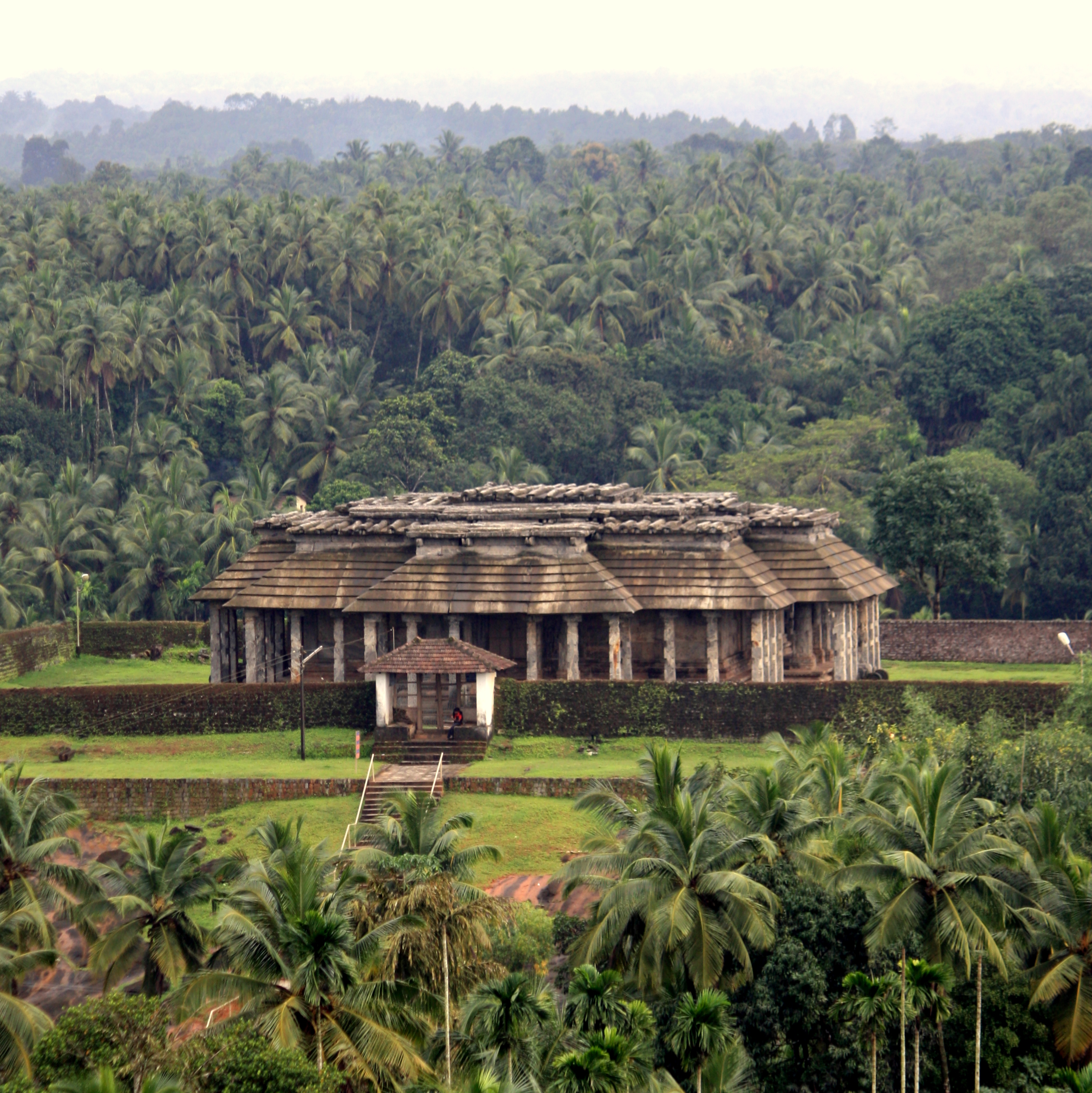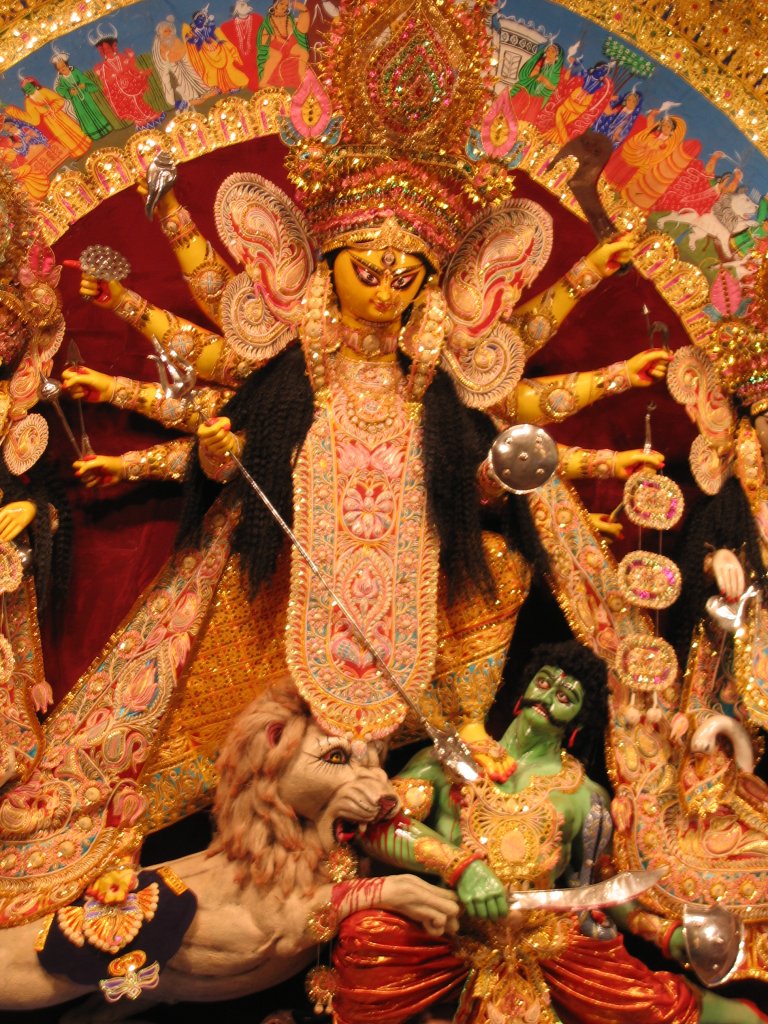|
Mundkur
Mundkur is a village in Karkala Taluk, Udupi district, Karnataka, India. The Durga Parameshwari temple located here was built circa 9th century AD. Deities The prime deity is Sri Durgaparameshwari in the form of Mahishamardini, holding the demon Mahisha upside down and piercing thrishul on his body. Hence the name Mundakke oori nintha OOru became Mundkur in the later stage as per one version. Other deities being worshiped are Sri MahaGanapathi (Kshipraprasaada swaroopi), Navagraha, Naaga, AshwaththaVriksha, Dhoomavathi, Raktheshwari, Vyaghra Chamundi (Pilichandi), Vaarahi (Panjurli), and Rakshopi Devatha (Protector from evil Spirits) in the temple. Photos of Sri Madhvacharya, Sri Vadiraja swamiji, Sri Raghavendra Swamiji, and Sri Bhootharaja are installed in Sri Madhva Mandira, where bhajans and poojas are held regularly. Notes References * * * * External linksMundkur Shri Durga Parameshwari Temple {{Settlements in Udupi district Villages in Udupi district Hind ... [...More Info...] [...Related Items...] OR: [Wikipedia] [Google] [Baidu] |
Karkala
Karkala ( ) ( ) is a town and the headquarters of eponymous Karkala taluk in the Udupi district of Karnataka state in India. It lies near the foothills of the Western Ghats, Karkala has a number of natural and historical landmarks, and is a major tourist and transit destination due to its strategic location along the way to Hebri, Sringeri, Kalasa, Horanadu, Udupi, Kollur, Subrahmanya and Dharmasthala. Etymology Black granite is abundant in the area, and used widely in the local architecture. Hence, the name of the town is derived from ''kari-kal'', meaning black stone. There is still a place called as ''Kariya Kall'' in the city which means 'Black Rock' in Tulu and Kannada languages. The name 'Kariya Kall/ ಕರಿಯಕಲ್ಲ್ changed to 'Karikal/ಕರಿಕಲ್' and eventually to 'Karkal/ಕರ್ಕಲ್/ಕಾರ್ಕಳ್'. However, some studies assert that the original name was 'Kari Kola' meaning 'elephant lake' in Tulu and Kannada languages, which ... [...More Info...] [...Related Items...] OR: [Wikipedia] [Google] [Baidu] |
Udupi
Udupi () also known as 'Odipu' () is a city in the Indian state of Karnataka. It is the administrative headquarters of Udupi district, and one of the fastest-growing cities in Karnataka. Udupi is one of the top tourist attractions in Karnataka and has various educational institutions. It is notable for the Udupi Sri Krishna Matha, Krishna Temple and is also known as the temple city. It also lends its name to the popular Udupi cuisine, is also known as Parashurama Kshetra, and is famous for Kanakana kindi. A centre of pilgrimage, Udupi is known as Rajatha Peetha pura Etymology The name 'Udupi' is derived from Tulu language, Tulu word "odipu", which means "emergence". It is also believed that it came from the Sanskrit word "Udupa", meaning "Moon". History In the 13th century, Vaishnavism, Vaishnavite saint Madhvacharya founded the Udupi Sri Krishna Matha, Sri Krishna Temple. He set up eight ''mathas'' – Ashta Mathas of Udupi, Ashta Mathas in Udupi to propagate the Dvaita Vedant ... [...More Info...] [...Related Items...] OR: [Wikipedia] [Google] [Baidu] |
Karnataka
Karnataka ( ) is a States and union territories of India, state in the southwestern region of India. It was Unification of Karnataka, formed as Mysore State on 1 November 1956, with the passage of the States Reorganisation Act, 1956, States Reorganisation Act, and renamed ''Karnataka'' in 1973. The state is bordered by the Lakshadweep Sea to the west, Goa to the northwest, Maharashtra to the north, Telangana to the northeast, Andhra Pradesh to the east, Tamil Nadu to the southeast, and Kerala to the southwest. With 61,130,704 inhabitants at the 2011 census, Karnataka is the List of states and union territories of India by population, eighth-largest state by population, comprising 31 List of districts in India, districts. With 15,257,000 residents, the state capital Bengaluru is the largest city of Karnataka. The economy of Karnataka is among the most productive in the country with a gross state domestic product (GSDP) of and a per capita GSDP of for the financial year 2023– ... [...More Info...] [...Related Items...] OR: [Wikipedia] [Google] [Baidu] |
Durga
Durga (, ) is a major Hindu goddess, worshipped as a principal aspect of the mother goddess Mahadevi. She is associated with protection, strength, motherhood, destruction, and wars. Durga's legend centres around combating evils and demonic forces that threaten peace, prosperity, and dharma, representing the power of good over evil. Durga is believed to unleash her divine wrath against the wicked for the liberation of the oppressed, and entails destruction to empower creation. Durga is seen as a motherly figure and often depicted as a beautiful woman, riding a lion or tiger, with many arms each carrying a weapon and often defeating demons. She is widely worshipped by the followers of the goddess-centric sect, Shaktism, and has importance in other denominations like Shaivism and Vaishnavism. The most important texts of Shaktism, Devi Mahatmya and Devi Bhagavata Purana, revere Devi (the Goddess) as the primordial creator of the universe and the Brahman (ultimate truth and reali ... [...More Info...] [...Related Items...] OR: [Wikipedia] [Google] [Baidu] |
Villages In Udupi District
A village is a human settlement or Residential community, community, larger than a hamlet (place), hamlet but smaller than a town with a population typically ranging from a few hundred to a few thousand. Although villages are often located in rural areas, the term urban village is also applied to certain urban neighborhoods. Villages are normally permanent, with fixed dwellings; however, transient villages can occur. Further, the dwellings of a village are fairly close to one another, not scattered broadly over the landscape, as a dispersed settlement. In the past, villages were a usual form of community for societies that practice subsistence agriculture and also for some non-agricultural societies. In Great Britain, a hamlet earned the right to be called a village when it built a Church (building), church. [...More Info...] [...Related Items...] OR: [Wikipedia] [Google] [Baidu] |





